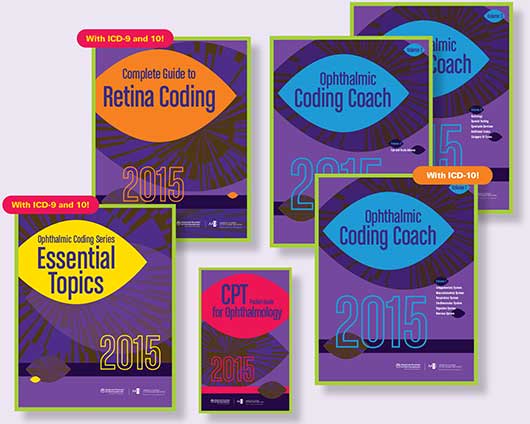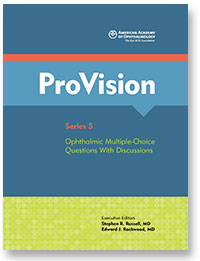Download PDF
WHAT’S HAPPENING
Ophthalmology: A Top Medical Specialty in Submitting Accurate Medicare Claims
According to the 2014 Comprehensive Error Rate Testing (CERT) report by the U.S. Department of Health & Human Services, ophthalmology has one of the lowest coding error rates (3.5 percent) of all specialty groups providing Medicare Part B service. This is considerably lower than the current national average error rate, which is 12.2 percent. The only specialty group with a lower error rate is thoracic surgery, at 0.4 percent.
Compared with other medical associations, the Academy stands out in developing and publishing an extensive array of ophthalmology-specific coding resources to ensure that practices code accurately and that they appropriately maximize reimbursements.
“The fact that ophthalmologists ranked among the lowest in errors of more than 50 types of providers audited through the CERT program is a testament to the care and expertise with which ophthalmologists code and, by extension, the training that they and their staff members have received through the Academy’s coding products and services,” said Robert E. Wiggins, Jr. MD, MHA, Academy Senior Secretary for Ophthalmic Practice.
“The Academy’s coding department is extremely proud of these results for the profession of ophthalmology,” he said.
For more information, visit www.aao.org/coding. To view the report, visit www.aao.org/aao/outofcs/wre/Advoc_CERT_Report2014_WRE_02_12_15.pdf.
 |
CODING FRONT-RUNNERS. Offerings continue to expand with the new 2015 Complete Guide to Retina Coding book, Chart-Auditing Service, and live nationwide coding seminars that include ICD-10 training.
|
TAKE NOTICE
PQRS Reporting via EHR: June 1 Deadline
Use the Intelligent Research in Sight (IRIS) Registry to streamline your reporting for the Physician Quality Reporting System (PQRS).
If you have an EHR. By integrating your EHR with the Academy’s clinical registry, you’ll have an easy way to report PQRS, provided that you meet three deadlines:
- June 1—submit signed IRIS Registry agreements.
- Aug. 1—your EHR system must be mapped to the IRIS Registry.
- Dec. 1—submit your signed consent form, allowing your information to be sent to CMS.
Technical requirements. The IRIS Registry requires access to data gathered by your EHR system in the current reporting period. Your EHR must be certified as a 2014 Certified EHR Technology by an Authorized Testing and Certification body.
If you don’t have an EHR. You can report via a qualified PQRS registry or a qualified clinical data registry. At time of press, CMS had not yet announced its list of qualified PQRS registries for 2015. The announcement is expected to come in May or June, and the Academy is confident that the list will include the IRIS Registry. Depending on which non-EHR reporting option you choose, the deadline for submitting signed IRIS Registry agreements is either Aug. 1 or Oct. 31.
Who can participate in the IRIS Registry. U.S.-based Academy members (and their staff members).
What it costs. Participation is free for U.S. members of the Academy (and their staff members).
How to get started. Go to www.aao.org/irisregistry and click “Sign Up.”
For more information on reporting PQRS, visit www.aao.org/pqrs.
|
ONE SPOTLIGHT: Choosing Wisely—New CME activity. Choosing Wisely is a national initiative created by the American Board of Internal Medicine Foundation, and it has participation from more than 60
U.S. medical specialty societies. The initiative aims to prompt conversations between doctors and their patients about efficient and appropriate care choices.
Choosing Wisely: Leading Patients to Recommended Care is a new CME activity developed by the Academy for ophthalmologists. It reviews the five commonly overused tests and procedures that were identified by the Academy for the Choosing Wisely campaign, and it cites evidence to support each recommendation. The activity also introduces strategies for physician-patient communication that may be helpful when evaluating whether tests and treatments are appropriate. This activity is eligible for AMA PRA Category 1 Credit.
To access the course, visit https://www.aao.org/pi-cme/choosing-wisely-course. For more about Choosing Wisely, including Five Things Ophthalmologists and Patients Should Question, visit www.aao.org/choosing-wisely.
|
Ask the Ethicist: Your Duty to Report
Q: I recently examined a longtime patient for a routine glaucoma check and discovered, to my surprise, that she’d had cataract surgery by a local ophthalmologist. The patient is functionally monocular. Prior to surgery, she had visual acuity of 20/50 in the left eye and counting fingers in the right eye due to an auto accident that resulted in an untreated hyphema, but she had no daily living complaints.
The patient said she had seen an advertisement in the newspaper with the following slogan: “Regain your visual freedom with cataract surgery at .” She was curious and went in for a “ free consultation,” and bilateral cataract surgery was scheduled shortly thereafter.
When I eventually saw her record from the cataract surgeon, I could find no recorded visual acuity tests, visual fields, or pressure checks for either eye, and nothing about her visual status in the right eye being related to trauma and not cataract. The only mention of informed consent was a handwritten comment stating, “Patient consents for surgery.” Luckily, the patient’s outcome in the left eye was good, and she sees 20/30. There was no change to the vision in the right eye.
I’m not one to make waves, but I’m hearing from colleagues in town that this is not unusual behavior for this ophthalmologist. What is our responsibility in this situation to protect patients?
A: The AMA’s Council on Ethical and Judicial Affairs Opinion 9.031: Reporting Impaired, Incompetent, or Unethical Colleagues, and Principle 6 of the Academy’s Code of Ethics discuss the responsibility of doctors to address concerns about unethical or inappropriate behavior with the physician in question. Rule 5 of the Code of Ethics also states that “it is the duty of other ophthalmologists who know of the impairment to take action to attempt correction of the situation.” Alternatively, you could refer the matter to the appropriate entity to prevent the continuation of the conduct.
Rule 6 of the Code of Ethics (Pretreatment Assessment) may also come into play in this scenario with respect to lack of appropriate preoperative assessment.
Whatever the reason—physician impairment, greed, or incompetence—the patient’s best interests do not appear to have been the primary driver of the bilateral cataract surgery.
In addition, many states have “duty to report” legislation requiring that physicians report colleagues in circumstances like these. If you truly suspect unethical, illegal, or impaired behavior in a colleague, protect patients and the profession by bringing your concerns to the attention of an appropriate entity able to resolve the situation in the best interests of all concerned.
For more information or to submit a question, contact the Ethics Committee staff at ethics@aao.org. To read the Code of Ethics, visit the Academy's website.
ACADEMY STORE
Order the Patient Portal and Meaningful Use Webinar
A recording of the American Academy of Ophthalmic Executives’ March 17 webinar, “Implementing a Patient Portal: A Roadmap for Meaningful Use and Patient Service” is available to order in a streaming, downloadable MP4, or CD-ROM format. This 60-minute webinar covers everything you need to know to implement a patient portal successfully and use it effectively. Ronald Sterling, an expert in electronic health records and practice management systems, presents a road map to meeting meaningful use requirements as well as getting the most of out of your investment.
For more information, visit www.aao.org/aaoewebinars.
Build an Interactive Self-Assessment
 Put your ophthalmic knowledge to the test. ProVision: Ophthalmic Multiple-Choice Questions With Discussions, Series 5, has 550 challenging multiple-choice questions that are now available in an interactive Academy eBook. Access the eBook from your computer or tablet to create a customized self-assessment test with your choice of subject areas and test length. You’ll receive your score instantly, along with detailed answers and supporting references.
Put your ophthalmic knowledge to the test. ProVision: Ophthalmic Multiple-Choice Questions With Discussions, Series 5, has 550 challenging multiple-choice questions that are now available in an interactive Academy eBook. Access the eBook from your computer or tablet to create a customized self-assessment test with your choice of subject areas and test length. You’ll receive your score instantly, along with detailed answers and supporting references.
For details and to purchase, visit www.aao.org/store.
MEETING MATTERS
June 24: Meeting Registration
Members get first dibs. The online reservation system for registration and hotels opens June 24 for Academy and AAOE members, and July 8 for nonmembers.
Find registration information, including fees and deadlines, at www.aao.org/registration.
June: Online Program Information Becomes Available
In early June, you can start accessing abstracts and other information about courses via the online Program Search at www.aao.org/2015.
You can look up information by presenter, keyword, or event number. You can also use pull-down menus to search the program by topic (e.g., “Cataract”), event type, (e.g., “Symposia”), or special interest (e.g., “Endorsed by Young Ophthalmologist Committee”). Log in to begin building your personal calendar before registration opens.
For more information and to view the online Program Search, visit www.aao.org/program.
D.C. REPORT
CMS' Intent to Improve Meaningful Use
In January, the Centers for Medicare & Medicaid Services (CMS) responded to the Academy’s recommendations to reduce Medicare Electronic Health Record Incentive Meaningful Use (MU) Program reporting burdens. The Academy is concerned about the large number of ophthalmologists who are receiving MU penalties. We believe that this is a reflection of the flawed nature of the program. Roughly 60 percent of ophthalmologists—about 10,000—will take a 1 percent MU penalty in 2015. These numbers could increase in future years as physicians advance through the more difficult phases of the program. Without major modifications to MU, many ophthalmologists who were successful in previous years will drop out of the program and face devastating penalties as a result.
The Academy has requested that CMS improve the MU program, specifically asking for increased flexibility within the current structure, reduced penalties, and shorter reporting periods. The Academy has also asked for the modification of certain measures to make them more reasonable for specialists to achieve. The Academy would like CMS to establish an alternative pathway to MU so that physicians who participate in an EHR-based clinical data registry, such as the IRIS Registry, would be exempt from penalties.
In response to the Academy’s advocacy efforts, CMS announced its intent to make major changes to the program this spring. CMS intends to reduce the reporting period from one year to just 90 days and make the program less complicated overall. The Academy will provide details of the new rules when they are released.
 |
|
RHODE ISLAND ADVOCACY AMBASSADORS IN ACTION. Left to right: Dr. Rizzuto; Advocacy Ambassadors, Charles A. Glass, MD, Anne E. Morganti, MD, and Jae Young You, MD; Speaker Mattiello; and Dr. Janigian.
|
MEMBERS AT LARGE
Advocacy Ambassadors Mentored by Leaders
Philip R. Rizzuto, MD, Academy Secretary for Communications, and Robert H. Janigian Jr., MD, Academy Councilor from Rhode Island, invited members in training who participated in the Academy’s Advocacy Ambassador Program to join them during a meeting at Dr. Rizzuto’s home with Rhode Island Speaker of the House Nicholas Mattiello. The Advocacy Ambassadors talked with the speaker about health care issues facing patients in Rhode Island.
The Advocacy Ambassador Program, which takes place at the Mid-Year Forum (MYF) in April in Washington, D.C., aims to engage and educate members in training about advocating for their profession; help them understand the importance of membership and active involvement in their state ophthalmology and subspecialty societies; and expose them to critical issues in medicine being discussed by leaders in ophthalmology during Congressional Advocacy Day, the MYF, and Council sessions.